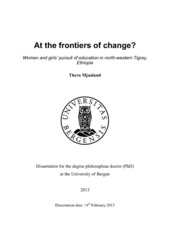At the frontiers of change? Women and girls’ pursuit of education in north-western Tigray, Ethiopia
Doctoral thesis
Permanent lenke
https://hdl.handle.net/1956/6361Utgivelsesdato
2013-02-14Metadata
Vis full innførselSamlinger
Sammendrag
The main objective for this anthropological study has been to investigate gendered processes of social reproduction and change from the perspective of women in the historical and socio-cultural context of north-western Tigray, in North-Ethiopia. The historical point of departure for this study is the Tigrayan liberation struggle from the mid-1970s, and through the 1980s, against the Ethiopian military regime, Derg, where female fighters in Tigray People’s Liberation Front (TPLF), had – together with civil women – been involved in forging their own revolution within the revolution for women’s emancipation and equality. Education, which during the struggle was one important tool in the fight to overthrow an oppressive regime, was also perceived as an important means to build a new society afterwards based on social, economic and political reform. Education has therefore continued to be important after the TPLF-based EPRDF (Ethiopian People’s Revolutionary Democratic Front) seized power in Ethiopia in May 1991 – in its pursuit of development and to become a middle-income country by the first half of the 2020s. It is from this perspective, together with the fact that new educational opportunities have opened up – not least for girls and women – who, historically, have occupied a marginal position in Ethiopian education, that education is defined as a ‘site’ where gendered processes of social reproduction and change could be operationalised and studied. The ethnographic enquiry, which spans three generations of Tigrayan women having lived through three different regimes with different political ideologies – including different possibilities in education – has been based on open-ended research foci where women’s and girls’ agency, their decision-making strategies and negotiations of power vis-à-vis different authorities are central. Women’s agency has, furthermore, been explored in the context of local understandings of gender, where the importance of guarding the ‘distinction’ between femaleness and maleness, is central. Based on the ethnographic data from Tigray, the intention has also been to contribute to theory-building on the issue of change by suggesting a modification of Pierre Bourdieu’s generative principle of habitus in his theory of practice. It is the limited space afforded agency that can venture beyond the structural conditioning of habitus, and the limited possibility for change evolving from diverging and non-compliant practice itself that has informed this theoretical discussion. While inspired by feminist appropriations of Bourdieu’s conceptual framework together with feminist understandings of embodiment, I have also drawn on Mustafa Emirbayer and Ann Misches’s analytical perspective on agency, which incorporates both repetitive aspects of social practice and the re-structuring impact of projecting ones imagination into the future, like Tigrayan female and male students in the present context do. The use of ‘frontiers’ as an analytical concept is further based on the presumption that conflicting perceptions and interests surface in the conjuncture between processes of social reproduction and change as well as between intersecting and possibly contradictory fields – that there are struggles and negotiations at stake that might, or might not, be confrontational – but that nevertheless goes beyond unquestioned submission to the practical sense that habitus generates in Bourdieu’s theory of practice. The complexity of contemporary processes in Tigray, reminds us that change, in spite of the forward-moving thrust of prevailing development discourse, is rarely a linear process in practice, and suggests, furthermore, that scrutinising power in gender relations continue to be important even with gender sensitive laws and policies in place, as in Ethiopia today.
